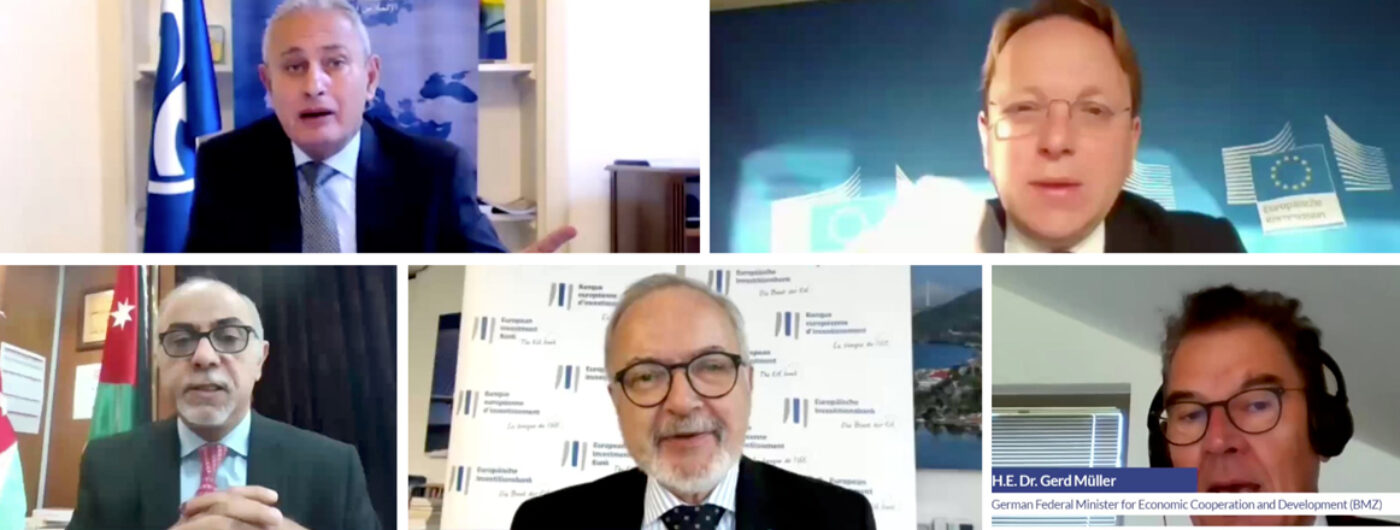
More than 300 international experts discuss how to create job and trade opportunities in times of COVID-19
-
- Over 300 experts, policymakers and representatives from the private sector, the civil society and international organizations today gathered online at the “UfM Trade and Investment Forum” to discuss trade, investment and employment opportunities in the Mediterranean region in light of the COVID-19 pandemic.
- The Forum was preceded by a Ministerial Meeting of the UfM Trade Ministers on 10 November. See Joint Ministerial Statement.
- Germany announced its support to finance the creation of a UfM Hub for Jobs, Trade and Investment Promotion in order to promote trade opportunities and contribute to facilitate access to finance, mobilize investments and strengthen regional value chains.
Barcelona, 12 November 2020. For decades, alarmingly high youth unemployment has left millions of young people in the Southern Mediterranean without a chance to build a career. With the COVID-19 pandemic sharply aggravating the economic and labour market conditions in the Southern Mediterranean, today’s UfM Trade and Investment Forum discussed the role of regional cooperation in confronting the crisis. The Forum was held under the title “Creating Opportunities for Jobs in times of COVID-19” in the framework of the 25th Anniversary of the Barcelona Process.
As the Secretary General of the Union for the Mediterranean (UfM), Nasser Kamel, pointed out: “The current health crisis threatens to undo over a decade of socio-economic progress in the Mediterranean Region.” At the same time, he emphasized the importance of regional integration in order to become more resilient against economic disruptions: “The current crisis forces the countries of the Mediterranean to rethink supply chains, trade integration and investment promotion. In this sense, the current crisis could indeed provide an opportunity for a stronger economic integration between Africa, the MENA region, and the EU”.
With trade inside the MENA region taking four times longer and being three times more expensive than trading across borders in OECD countries, German Development Minister Gerd Müller and EU Commissioner for Neighbourhood and Enlargement Olivér Várhelyi stressed the importance of a joint European effort for trade facilitation and investment promotion in the Southern European neighbourhood. “We must strengthen our cooperation with the Southern Neighbourhood to better manage systemic challenges and boost the economic development and recovery. Creating more resilient economies and societies is in our common interest. Southern Neighbourhood needs to emerge from the COVID-19 crisis as a prime location for investments, offering growth and jobs in a sustainable way and providing for stronger societies that give hope and opportunity to the young generations to find their future in the region. We are working together with partners to prepare a new economic development strategy for the region”, said Commissioner Várhelyi.
In order to strengthen the UfM’s capacity of action as a platform for regional dialogue and cross-border cooperation in the Mediterranean, Germany announced their support to finance the creation of a UfM Hub for Jobs, Trade and Investment Promotion. “Thanks to the German support, the operationalization of this Hub under the umbrella of the UfM Secretariat will bring a value added to the promotion of trade and investment relations as a means to inclusive economic development and decent job creation in the Southern Mediterranean, thus fostering new trade linkages between the Euro-Mediterranean region and African countries”, said UfM Secretary General Kamel.
The UfM Hub will increase the UfM’s means to promote regional dialogue on the implementation and use of existing trade agreements, the approximation of standards and technical requirements and the potential of digital trade and trade in services. It will also serve to address regional priorities such as access to finance and the mobilization of investments, the development of regional value chains, as well as the integration of social, trade, financial, economic and environmental policies.

